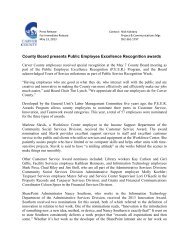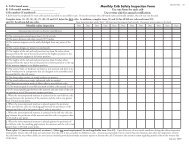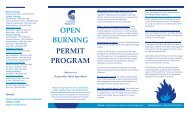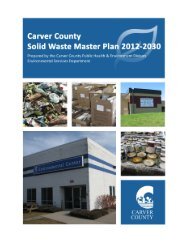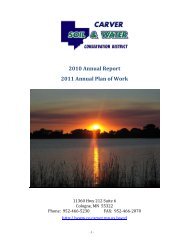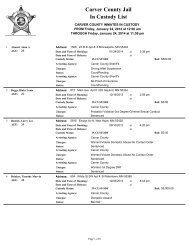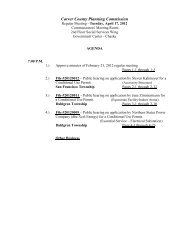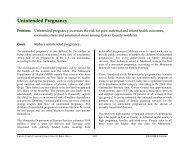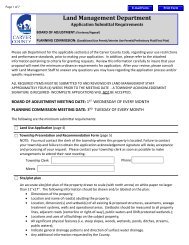Older Adults and Depression - NIMH - National Institutes of Health
Older Adults and Depression - NIMH - National Institutes of Health
Older Adults and Depression - NIMH - National Institutes of Health
Create successful ePaper yourself
Turn your PDF publications into a flip-book with our unique Google optimized e-Paper software.
<strong>Older</strong> <strong>Adults</strong><br />
<strong>and</strong> <strong>Depression</strong><br />
Do you feel very tired, helpless <strong>and</strong><br />
hopeless? Are you sad most <strong>of</strong> the time<br />
<strong>and</strong> take no pleasure in your family,<br />
friends, or hobbies? Are you having<br />
trouble working, sleeping, eating, <strong>and</strong><br />
functioning? Have you felt this way for<br />
a long time?<br />
If so, you may have depression.<br />
<strong>National</strong> Institute <strong>of</strong> Mental <strong>Health</strong><br />
U.S. DeparTMeNT <strong>of</strong> HealTH aND HUMaN ServIceS<br />
<strong>National</strong> <strong>Institutes</strong> <strong>of</strong> <strong>Health</strong>
<strong>Older</strong> <strong>Adults</strong> <strong>and</strong> <strong>Depression</strong><br />
What is depression?<br />
Everyone feels down or sad sometimes, but these<br />
feelings usually pass after a few days.When you have<br />
depression, you have trouble with daily life for weeks<br />
at a time. <strong>Depression</strong> is a serious illness that needs<br />
treatment. If left untreated, depression can lead to<br />
suicide.<br />
<strong>Depression</strong> is a common problem among older<br />
adults, but it is not a normal part <strong>of</strong> aging. It may be<br />
overlooked because for some older adults who have<br />
depression, sadness is not their main symptom.They<br />
may have other, less obvious symptoms <strong>of</strong> depression<br />
or they may not be willing to talk about their feelings.<br />
Therefore, doctors may be less likely to recognize that<br />
their patient has depression.
What are the different forms <strong>of</strong> depression?<br />
There are several forms <strong>of</strong> depression.The most common<br />
forms are:<br />
Major depression—severe symptoms that interfere with<br />
your ability to work, sleep, study, eat, <strong>and</strong> enjoy life. Some<br />
people may experience only a single episode within their<br />
lifetime, but more <strong>of</strong>ten a person may have multiple episodes.<br />
Dysthymic disorder, or dysthymia—depressive symptoms<br />
that last a long time (2 years or longer) but are less severe<br />
than those <strong>of</strong> major depression.<br />
Minor depression—similar to major depression <strong>and</strong><br />
dysthymia, but symptoms are less severe <strong>and</strong> may not last<br />
as long.<br />
What are the signs <strong>and</strong> symptoms <strong>of</strong><br />
depression?<br />
Different people have different symptoms. Some symptoms <strong>of</strong><br />
depression include:<br />
• Feeling sad or “empty”<br />
• Feeling hopeless, irritable, anxious, or guilty<br />
• Loss <strong>of</strong> interest in favorite activities<br />
• Feeling very tired<br />
• Not being able to concentrate or remember details<br />
• Not being able to sleep, or sleeping too much<br />
• Overeating, or not wanting to eat at all<br />
• Thoughts <strong>of</strong> suicide, suicide attempts<br />
• Aches or pains, headaches, cramps, or digestive problems.<br />
What causes depression?<br />
Several factors, or a combination <strong>of</strong> factors, may contribute to<br />
depression.<br />
Genes—people with a family history <strong>of</strong> depression may be<br />
more likely to develop it than those whose families do not<br />
have the illness. <strong>Older</strong> adults who had depression when they
were younger are more at risk for developing depression<br />
in late life than those who did not have the illness earlier<br />
in life.<br />
Brain chemistry—people with depression may have<br />
different brain chemistry than those without the illness.<br />
Stress—loss <strong>of</strong> a loved one, a difficult relationship, or any<br />
stressful situation may trigger depression.<br />
For older adults who experience depression for the first<br />
time later in life, the depression may be related to changes<br />
that occur in the brain <strong>and</strong> body as a person ages. For<br />
example, older adults may suffer from restricted blood<br />
flow, a condition called ischemia. Over time, blood vessels<br />
may stiffen <strong>and</strong> prevent blood from flowing normally to<br />
the body’s organs, including the brain.<br />
If this happens, an older adult with no family history <strong>of</strong><br />
depression may develop what is sometimes called “vascular<br />
depression.”Those with vascular depression also may be<br />
at risk for heart disease, stroke, or other vascular illness.<br />
<strong>Depression</strong> can also co-occur with other serious medical<br />
illnesses such as diabetes, cancer, heart disease, <strong>and</strong><br />
Parkinson’s disease. <strong>Depression</strong> can make these conditions<br />
worse, <strong>and</strong> vice versa. Sometimes, medications taken<br />
for these illnesses may cause side effects that contribute<br />
to depression.A doctor experienced in treating these<br />
complicated illnesses can help work out the best treatment<br />
strategy.<br />
How is depression treated?<br />
The first step to getting appropriate treatment is to visit<br />
a doctor. Certain medications or conditions can cause<br />
symptoms similar to depression.A doctor can rule out<br />
these factors by doing a complete physical exam, interview,<br />
<strong>and</strong> lab tests.<br />
If these other factors can be ruled out, the doctor may<br />
refer you to a mental health pr<strong>of</strong>essional, such as a<br />
psychologist, counselor, social worker, or psychiatrist. Some
doctors are specially trained to treat depression <strong>and</strong><br />
other mental illnesses in older adults.<br />
The doctor or mental health pr<strong>of</strong>essional will ask<br />
about the history <strong>of</strong> your symptoms, such as when<br />
they started, how long they have lasted, their severity,<br />
whether they have occurred before, <strong>and</strong> if so, whether<br />
they were treated <strong>and</strong> how. He or she will then diagnose<br />
the depression <strong>and</strong> work with you to choose the most<br />
appropriate treatment.<br />
It is important to remember that a person with<br />
depression cannot simply “snap out <strong>of</strong> it.” Treatment<br />
choices differ for each person, <strong>and</strong> sometimes different<br />
treatments must be tried until you find one that works.<br />
Medications called antidepressants can work well to<br />
treat depression.They can take several weeks to work.<br />
Antidepressants can have side effects including:<br />
• Headache<br />
• Nausea—feeling sick to your stomach<br />
• Difficulty sleeping or nervousness<br />
• Agitation or restlessness<br />
• Sexual problems.<br />
Most side effects lessen over time. Talk to your<br />
doctor about any side effects you have.<br />
Psychotherapy can also help treat depression.<br />
Psychotherapy helps by teaching new ways <strong>of</strong> thinking<br />
<strong>and</strong> behaving, <strong>and</strong> changing habits that may be
contributing to the depression.Therapy can help you<br />
underst<strong>and</strong> <strong>and</strong> work through difficult relationships<br />
or situations that may be causing your depression or<br />
making it worse.<br />
Electroconvulsive therapy (ECT) is sometimes<br />
used for severe depression that is very difficult to<br />
treat <strong>and</strong> does not respond to medication or therapy.<br />
Although ECT once had a bad reputation, it has<br />
greatly improved <strong>and</strong> can provide relief for people for<br />
whom other treatments have not worked. ECT may<br />
cause side effects such as confusion <strong>and</strong> memory loss.<br />
Although these effects are usually short-term, they can<br />
sometimes linger.<br />
How can I help a loved one who is<br />
depressed?<br />
If you know someone who has depression, first help<br />
him or her see a doctor or mental health pr<strong>of</strong>essional.<br />
• Offer support, underst<strong>and</strong>ing, patience, <strong>and</strong><br />
encouragement.<br />
• Talk to him or her, <strong>and</strong> listen carefully.<br />
• Never ignore comments about suicide, <strong>and</strong> report<br />
them to your loved one’s therapist or doctor.<br />
• Invite him or her out for walks, outings, <strong>and</strong> other<br />
activities.<br />
• Remind him or her that with time <strong>and</strong> treatment,<br />
the depression will lift.<br />
How can I help myself if I am depressed?<br />
As you continue treatment, gradually you will start<br />
to feel better. Remember that if you are taking an<br />
antidepressant, it may take several weeks for it to start<br />
working. If a first antidepressant does not work, be<br />
open to trying another.You may need to try a few<br />
different medications before finding one that works<br />
for you.
Try to do things that you used to enjoy before you had<br />
depression. Studies have shown that doing these things,<br />
even when you don’t expect to enjoy them, can help lift<br />
your spirits. Go easy on yourself. Other things that may<br />
help include:<br />
• <br />
• <br />
• <br />
• <br />
Breaking up large tasks into small ones, <strong>and</strong> doing<br />
what you can as you can. Don’t do too many things<br />
at once.<br />
Spending time with other people <strong>and</strong> talking to a<br />
friend or relative about your feelings.<br />
Once you have a treatment plan, try to stick to it.<br />
It will take time for treatment to work.<br />
Do not make important life decisions until you feel<br />
better. Discuss decisions with others who know<br />
you well.<br />
If you are in a crisis<br />
<strong>Older</strong> adults with depression are at risk for suicide.<br />
In fact, white men age 85 <strong>and</strong> older have the highest<br />
suicide rate in the United States.<br />
If you are thinking about harming yourself or <br />
attempting suicide, tell someone who can help <br />
immediately.<br />
• Call your doctor.<br />
• Call 911 for emergency services.<br />
• Go to the nearest hospital emergency room.<br />
• Call the toll-free, 24-hour hotline <strong>of</strong> the <strong>National</strong><br />
Suicide Prevention Lifeline at 1-800-273-TALK<br />
(1-800-273-8255);TTY: 1-800-799-4TTY (4889)<br />
to be connected to a trained counselor at a suicide<br />
crisis center nearest you.
Contact us to find out more information on<br />
<strong>Older</strong> <strong>Adults</strong> <strong>and</strong> <strong>Depression</strong>.<br />
<strong>National</strong> Institute <strong>of</strong> Mental <strong>Health</strong><br />
ScienceWriting, Press & Dissemination Branch<br />
6001 Executive Boulevard<br />
Room 8184, MSC 9663<br />
Bethesda, MD 20892-9663<br />
Phone: 301-443-4513 or<br />
1-866-615-<strong>NIMH</strong> (6464) toll-free<br />
TTY: 301-443-8431 or<br />
1-866-415-8051 toll-free<br />
E-mail: nimhinfo@nih.gov<br />
Website: www.nimh.nih.gov<br />
The photos in this publication are <strong>of</strong> models <strong>and</strong> are used for<br />
illustrative purposes only.<br />
U.S. DeparTMeNT <strong>of</strong> HealTH aND HUMaN ServIceS<br />
<strong>National</strong> <strong>Institutes</strong> <strong>of</strong> <strong>Health</strong><br />
NIH publication No. Qf 11-7697



